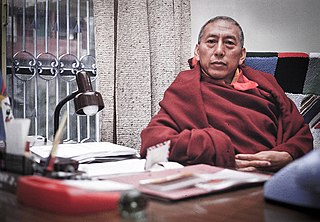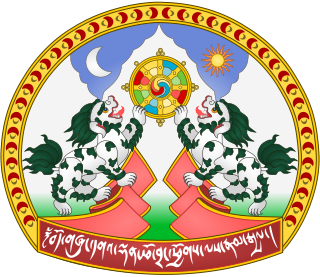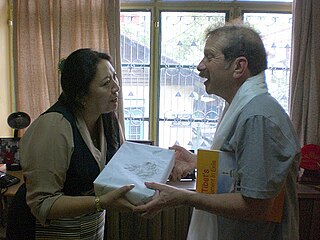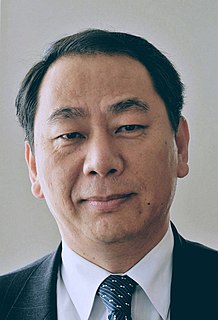
Theocracy is a form of government in which one or more deities of some type are recognized as supreme ruling authorities, giving divine guidance to human intermediaries who manage the day-to-day affairs of the government.

The Central Tibetan Administration, often referred to as the Tibetan Government-in-Exile, is a non-profit political organization based in Dharamshala, India. Its organization is modeled after an elective parliamentary government, composed of a judiciary branch, a legislative branch, and an executive branch.

Lobsang Tenzin, better known by the titles Professor Venerable Samdhong Rinpoche and to Tibetans as the 5th Samdhong Rinpoche, is a Tibetan Buddhist monk and politician who served as the Prime Minister of the cabinet of the Central Tibetan Administration, the Tibetan government-in-exile based in Dharamshala, India.

The Central Institute of Higher Tibetan Studies, formerly called Central University for Tibetan Studies (CUTS), is a Deemed University founded in Sarnath, Varanasi, India, in 1967, as an autonomous organisation under Union Ministry of Culture. The CIHTS was founded by Pt. Jawahar Lal Nehru in consultation with Tenzin Gyatso, the Dalai of Lama, with the aim of educating Tibetan youths in exile and Himalayan border students as well as with the aim of retranslating into Sanskrit and translating into Hindi and other modern Indian languages lost Indo-Buddhist Sanskrit texts that now exist only in Tibetan.

Tempa Tsering.

The Sikyong is the political leader of the Central Tibetan Administration, a Tibetan exile organisation also known as the Tibetan Government-in-Exile based on the 2011 Charter of Tibetans-in-exile. The title was created in 2012 after the 14th Dalai Lama decided not to assume any political and administrative authority as the head of the Tibetan Administration for Tibetans-in-exile.

The Tibetan Parliament in Exile (TPiE), officially the Parliament of the Central Tibetan Administration, is the unicameral and highest legislative organ of the Central Tibetan Administration, the government-in-exile of the Tibet Autonomous Region of China. It was established and is based in Dharamshala, India. The creation of this democratically elected body has been one of the major changes that the 14th Dalai Lama brought about in his efforts to introduce a democratic system of administration.

The Kashag, was the governing council of Tibet during the rule of the Qing dynasty and post-Qing period until the 1950s. It was created in 1721, and set by Qianlong Emperor in 1751 for the Ganden Phodrang in the 13-Article Ordinance for the More Effective Governing of Tibet. In that year the Tibetan government was reorganized after the riots in Lhasa of the previous year. The civil administration was represented by Council (Kashag) after the post of Desi was abolished by the Qing imperial court. The Qing imperial court wanted the 7th Dalai Lama to hold both religious and administrative rule, while strengthening the position of the High Commissioners.

Lobsang Sangay is a Tibetan-American politician who was Kalon Tripa of the Tibetan Administration from 2011 to 2012, and Sikyong of the Central Tibetan Administration from 2012 to 2021.

The National Democratic Party of Tibet is a major party in the Tibetan government in exile, officially the Central Tibetan Administration, based in India.

Tethong Tenzin Namgyal is a Tibetan politician and a former Prime Minister of Central Tibetan Administration.

Tsering Dhondup, also known as Tsering Dhundup Yangdhar, is the Minister of Finance of the Tibetan-government-in-exile, officially known as Central Tibetan Administration (CTA).

Dölma Gyari is a well-known Tibetan politician in exile, a former activist, active since the early 1980s.

Alak Jigme Thinley Lhundup or Alak Jigme Lhundup Rinpoche was a Tibetan Tulku, as well as the former speaker of the Tibetan Parliament in Exile and former Minister with the exile Tibet administration.

The Central Tibetan Administration’s general elections were held for the second time on March 20, 2011 to elect the Kalon Tripa of the Tibetan government in exile. This was the third time Tibetans in exile were able to choose their Prime Minister as the office was traditionally appointed by the Dalai Lama. Elections for the 43 Chitue (members) of the Tibetan Parliament in Dharamshala were also held. Some 49,000 of the 83,000 Tibetans registered to vote took part in the election.

Elections for the office of Sikyong and the Chitue (Members) of the Tibetan Parliament in Exile were held between October 18, 2015 and March 20, 2016. Tibetans in exile voted for the fourth time their political representative and executive of the Central Tibetan Administration, the self-proclaimed Tibetan government in exile. The election was overseen and organized by the independent CTA agency, Tibetan Election Commission.

General elections for Kalon Tripa of the Tibetan government in exile and members of the Parliament of the Central Tibetan Administration were held on June 3, 2006, by members of the Tibetan diaspora. The election took place, as usual, after a preliminary election held on March 18, 2005. The original election's date was postponed as requested from the community on India due to the fact that this was settled originally for December 22, 2005, because many voters depended on winter tourism. The process was organized by the Tibetan Electoral Commission. Then incumbent Kalon Tripa Lobsang Tenzin won the election with more than 90% of the votes cast over former Kalon (Minister) Juchen Thubten Namgyal.
Elections for the 43 seats in the Tibetan Parliament in Exile were held on April 25, 1996. Organized by the Tibetan Electoral Commission, participation was reported at some 32880 votes. Tibetans in exile elected representatives from the three historical regions of Tibet, the four classic Tibetan Buddhist schools, the traditional pre-Buddhist Bön religion and representatives of the exile community in Europe and the Americas. Three members were appointed by the Dalai Lama. The Samdhong Rinpoche y Thupten Lungrig were elected President and Vice-president of the Parliament.

Lobsang Nyandak, sometimes written Lobsang Nyendak also called Lobsang Nyandak Zayul is a Tibetan diplomat and politician. born in 1965 in Kalimpong, India where he performed his studies in Herbertpur and at Panjab University in Chandigarh. There, he held functions at Tibetan Youth Congress before becoming the founding Executive Director of the Tibetan Centre for Human Rights and Democracy. Member of the National Democratic Party of Tibet, he was elected deputy and was selected as a minister by Samdhong Rinpoche, the first elected Kalon Tripa of Central Tibetan Administration (CTA). He then was the Representative of the 14th Dalai Lama to the Americas and became president of The Tibet Fund.

Rizong Sras Rinpoche is an Indian cleric from Ladakh born in 1928 who was the 102nd Ganden Tripa - now known as Ganden TrisurRizong Rinpoche. Prior to becoming the Ganden Tripa, he was the Jangtse Chöje Rinpoche from Gyüme Tantric College.


















